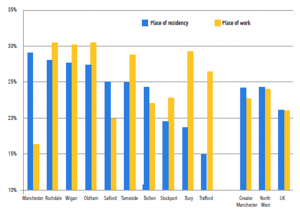Dr Jo Cartwright, Research Associate at The University of Manchester examines the labour market challenges facing the Greater Manchester region and offers ways in which the new Mayor could tackle them.
- While Greater Manchester has a growing jobs market, there are issues with the quality of this growth – one in four local residents in Manchester, Wigan, Rochdale and Oldham are employed in low wage work.
- The devolution agenda and the new Mayor provide a potential opportunity and appetite to address the inequalities in the labour market.
- There is a legacy of good employment standards across Greater Manchester – the Mayor could develop this further by implementing a consistent Greater Manchester Combined Authority wide employment and procurement strategy (extended to social care).
- Employers should be encouraged to upgrade jobs in low paying sectors such as retail, hospitality and social care. There also needs to be a fairer distribution of wealth in the high value added sectors.
Greater Manchester has a strong and growing economy. We have seen falling unemployment and growth in many high skilled jobs, with significant investment in industrial and creative hubs in the region (e.g. Salford’s Media City and Manchester’s Airport City). However, this growth has not been distributed evenly, with more than one in four local residents in Manchester, Wigan, Rochdale and Oldham employed in jobs paying below the Living Wage (see figure 1). The problem is these areas have a high share of jobs in low paying sectors such as retail, hospitality and social care, meaning that local residents’ labour market opportunities are constrained by virtue of where they live.
Figure 1: showing the share of all employee jobs in Greater Manchester paid less than the Living Wage, by residence and place of work, 2016. Notes: gross hourly earnings excluding overtime for employee jobs (place of residency and place of work); all adult employees; authors’ estimations from decile earnings figures. Source: Annual Survey of Hours and Earnings 2016.
Even the high value added sectors are not without their challenges. Self employment and freelance work are common in the digital and creative industry but this raises questions over access to basic employment rights and social protection (e.g. media spotlight on the ‘gig’ economy). There are also problems around upskilling and career progression which has a specific impact on young people. Overall, this apparent segmentation of ‘good’ and ‘bad’ jobs tends to have a disproportionate impact on specific workforce groups. This includes women, the young, older people, individuals with few educational qualifications, specific ethnic groups and migrant workers (see report for details).
Whilst this paints a relatively bleak picture for the development of an inclusive labour market in Greater Manchester, the devolution agenda and the new Mayor provide a potential opportunity and appetite to address some of these issues. As such, it seems timely to offer some suggestions to help tackle some of the issues identified. These have been borne out of research being conducted by myself and colleagues at the Alliance Manchester Business School on the challenges to ‘just’ (or decent) work in Greater Manchester. We have based our research on interviews with local stakeholders and secondary data analysis, and are currently in the process of organising case studies of organisations in GM on a range of priority areas. Our first report is available here.
Messages for the new GM Mayor:
- There is a legacy of good employment standards across the ten local authorities (as key public sector employers), as well as good approaches to procurement. The Mayor could develop this further by implementing a consistent Greater Manchester Combined Authority wide employment and procurement strategy. This could protect Greater Manchester public sector workers against potential cuts to employment rights as a result of Brexit (e.g. TUPE Regulations, family leave entitlements and the Working Time Regulations, to name but a few). The impact of this is sizeable given that Manchester City Council alone employs 7,000 people – that is before counting outsourced services including social care.
- Currently, local authority procurement strategies do not often extend their good practice approaches to the social care sector. The devolved health and social care budget could provide the Mayor with the opportunity to address the undervaluation of this important service.
- The Mayor could use his ‘soft powers’ to encourage employers to upgrade jobs (job design and career progression) in low paying sectors such as retail, hospitality and social care. This should also include improving fringe benefits. For example, retail and hospitality workers ought to be paid more for unsocial hours including weekend, nights and evening work. These recommendations have the potential to tackle some of the inequalities faced by specific workforce groups that tend to work in low wage sectors.
- There also needs to be a fairer distribution of wealth in the high value added sectors. This could include strengthening investments in existing high-tech hubs around GM to encourage job growth and careers in high value added businesses (e.g. ‘the Sharp Project’ and ‘the Landing’ which are partly funded by Manchester and Salford City Councils).
- There also needs to be a focus on developing young people’s careers in these high value added sectors. The local authority could set up an employer forum to discuss the potential for sectoral level initiatives to support young people’s careers. This could look like the ‘SharpFutures POD’ but at a sectoral and GM scale (for example, to provide opportunities across Media City).
- There is also some good work being done by local stakeholders in our region (see report for details). However, these efforts are being constrained by austerity budget cuts. This means fewer opportunities for information, advice and support for those who need it most (e.g. the unemployed). The Mayor could reassess investment into such support services, and potentially take a different approach to Westminster by ensuring all workers have access to social protection.

